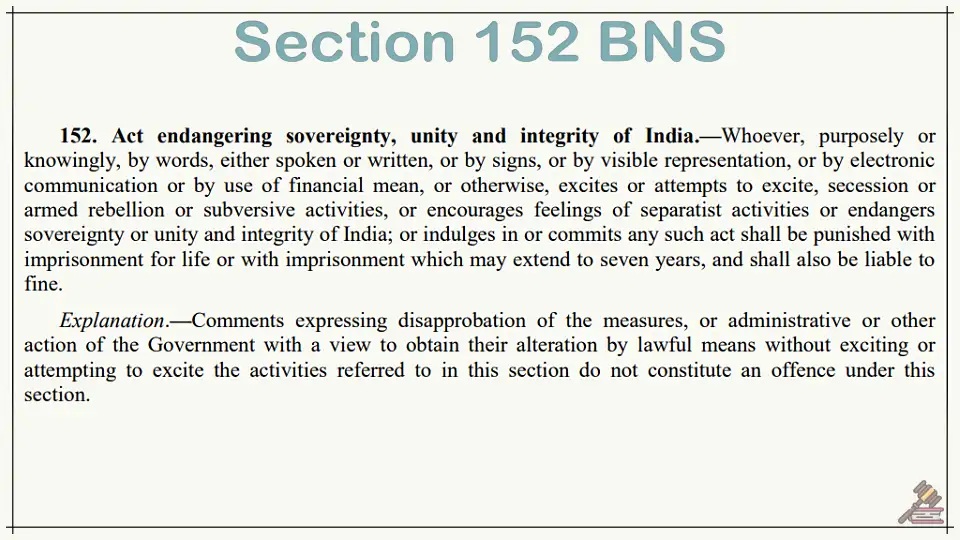Why in the News?
The Supreme Court has raised a key question—whether the “potentiality of abuse” of Section 152 of the Bharatiya Nyaya Sanhita (BNS), which punishes acts endangering the sovereignty, unity, and integrity of India, could be a ground to declare the provision unconstitutional.

About Section 152 BNS:
- Deals with: Acts endangering sovereignty, unity, and integrity of India.
- Origin: Introduced in the Bharatiya Nyaya Sanhita, 2023, effective 1 July 2024, replacing Section 124A IPC (sedition).
- Scope: Criminalises purposeful or knowing acts that:
- Excite secession, armed rebellion, or subversive activities.
- Encourage separatist feelings.
- Endanger sovereignty, unity, or integrity of India.
- Means Covered: Words (spoken/written), signs, visible representation, electronic communication, financial means, or any other method.
- Punishment: Life imprisonment or imprisonment up to 7 years + fine.
- Nature of Offence: Cognizable, non-bailable, triable by Court of Session.
- Exception Clause: Lawful criticism of government measures to seek change—without inciting rebellion/secession—is not an offence.
- Key Difference from Section 124A IPC: Focus shifted from “disaffection against Government” to direct threats against the nation’s unity and sovereignty, with explicit recognition of digital-era methods.
Issues with Section 152 BNS:
- Potential for Misuse: Broad and subjective terms like “endangering sovereignty” can be stretched to target political dissent, journalism, and activism.
- Vagueness: Undefined concepts (e.g., “sovereignty” in context of speech) create uncertainty, enabling arbitrary interpretation by authorities.
- Similarity to Sedition Law: Despite rewording, its core effect mirrors Section 124A IPC, which is under constitutional challenge for curbing free speech.
- Chilling Effect on Free Speech: Risk of self-censorship among journalists, activists, and citizens due to fear of prosecution.
- High Punishment and Cognizability: Harsh penalties combined with arrest without warrant heighten scope for harassment before judicial scrutiny.
- Digital Surveillance Concerns: Explicit coverage of electronic communication and financial means may widen investigative reach into personal digital activities.
- Judicial Burden: Courts will need to repeatedly interpret the law to balance Article 19(1)(a) freedom of speech with state security.
| [UPSC 2025] Sedition has become my religion” was the famous statement given by Gandhiji at the time of:
(a) the Champaran Satyagraha (b) publicly violating Salt Law at Dandi* (c) attending the Second Round Table Conference in London (d) the launch of the Quit India Movement |
Get an IAS/IPS ranker as your 1: 1 personal mentor for UPSC 2024

